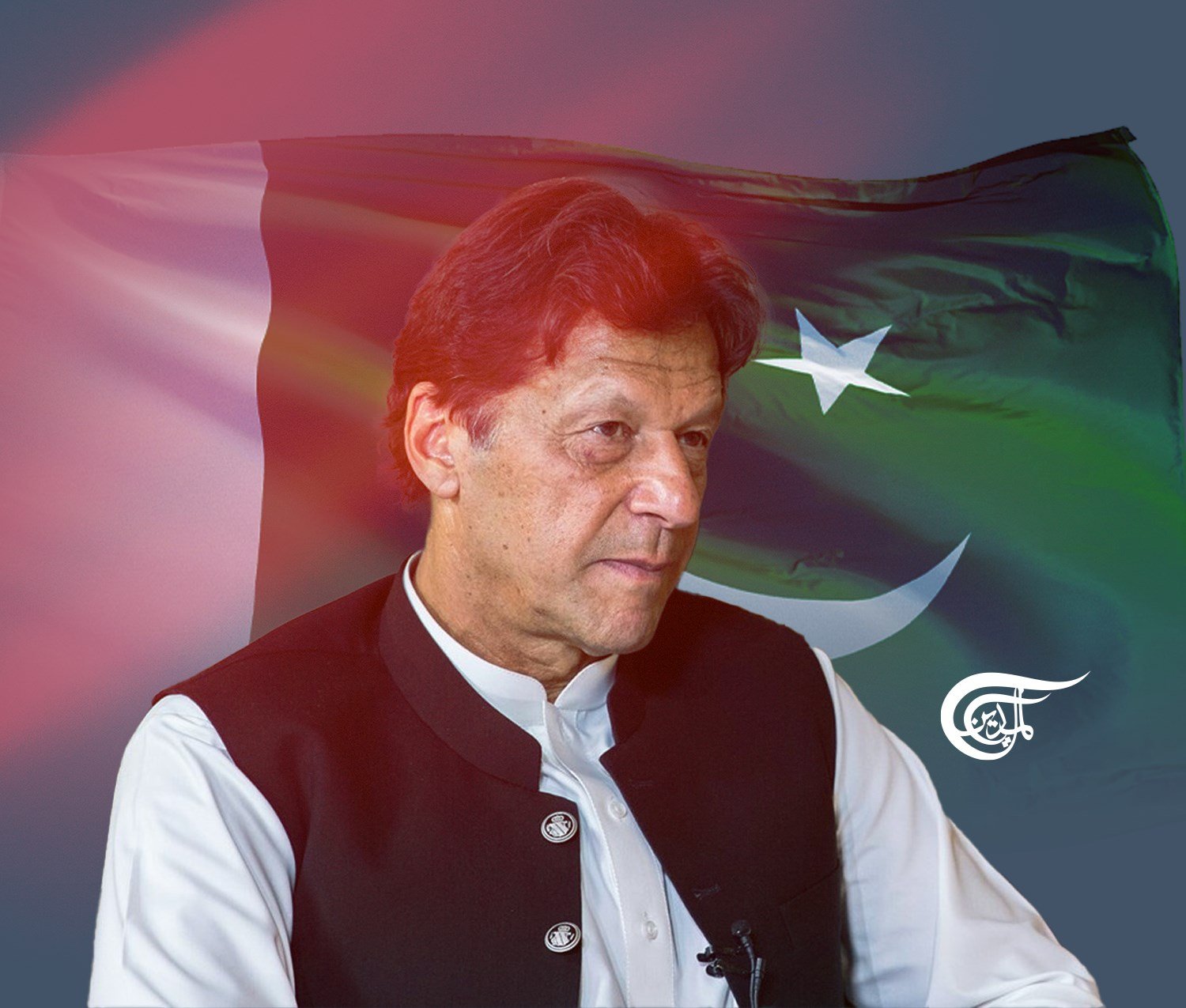Will Imran Khan be back for a new Pakistan?
It can safely be said that Imran Khan's tremendous election victory in 2018 was due to the Pakistanis getting fed up with the corruption and subordination to foreign powers.
Imran Khan is exceptional among the leaders who ruled Pakistan over the past decades. He’s an outsider; not from the traditional parties (the Bhuttos and Sharifs) and not from the military establishment either. It can safely be said that his tremendous election victory in 2018 was due to the Pakistanis getting fed up with the corruption and subordination to foreign powers (mainly the US and Saudi Arabia) that characterized the traditional ruling class for years.
He was patient and persistent. Actually, it took him a very long time before he managed to convince the Pakistanis, especially the youth, to go along with his anti-corruption, new-Pakistan rhetoric and that time has come for change. On a personal level, Imran Khan isn’t like his predecessors. He’s not a son of a feudal family, like Benazir Bhutto or her husband Asif Zardari (who was more or less a gangster), nor was he like the corrupt business tycoon (who was convicted of bribery and money laundering charges). And naturally, he’s not an army chief like Zia-ul-Haq or Pervez Musharraf.
When the handsome cricket world cup winner, who married the daughter of billionaire Sir James Goldsmith, returned from the UK and settled in his homeland in 1996, he immediately turned to politics, building on his popularity, and established the PTI Party (Movement for Justice). However, PTI’s success was very limited and it won one seat only in the Parliament, that of Khan himself. PTI needed more than two decades to finally, in 2018, win the general elections in the country, with 16.9 million votes – more than any other party, enabling Imran Khan to form a coalition government headed by him.
Critical of the US
Imran Khan is a long-time critic of the US policy toward his country. America’s attitude particularly in Afghanistan was a subject of many harsh statements made by Imran Khan. He refused to allow the US to establish military bases in Pakistan to “fight terrorism”. He also objected to the American army’s drones (un-authorized) operations in Pakistan targeting “terrorist entities”, adding that Pakistan “was the only country in history to be so bombed by an ally! These strikes caused immense civilian casualties, riling up anti-American sentiment further," concluding that “Pakistan paid a very heavy price of siding with US in Afghanistan”. He expressed his anger toward American officials who have pointed fingers at Islamabad when apportioning blame for the US failure in Afghanistan. In 2019, Khan wrote in the Washington Post that “Pakistan suffered more than 80,000 casualties and lost over $150 billion in the economy. The conflict drove 3.5 million of our citizens from their homes”.
Certainly, such remarks from Imran Khan didn’t go well with American political and military officials.
Stronger strategic relations with China
Apart from the Afghan issue, the US wasn’t especially pleased with Imran Khan’s approach toward China. It is true that China-Pakistan relations are old and well-established, but Khan has taken steps further, obviously believing that Pakistan’s future lies with Beijing, not Washington. After only two months in office, Khan traveled to China to enhance the “China-Pakistan Economic Corridor," a massive infrastructure investment program of $62 billion that makes China the central engine for economic development in Pakistan.
When Khan met with China’s leader Xi, he said that he “came to learn” how to encounter economic hardships. In Feb 2022, he returned to China for a visit during which he thanked China “for providing precious help to Pakistan in its fight against the COVID-19 pandemic. The vaccines provided by China saved not only the Pakistani people, but its economy." He went on to say, “Profound and complex changes are taking place in the current international political and economic landscape, but no force can hold back the advance of China, whose growth of strength is unstoppable. China has eradicated absolute poverty, which is the greatest achievement that human society could expect." Khan concluded his statements by confirming that Pakistan “will stand firmly with China at any time."
Imran Khan also defended China’s policy in Xinjiang Uygur Autonomous Region ((XUAR) and told CNN that Pakistan's ambassador to China Moinul Haq had visited XUAR and reported that the situation over there is "not what the Western media portrays”. That stance, coming from the leader of one of the biggest Muslim countries in the world, was understandably appreciated by China’s leaders.
During Trump’s presidency, changes in strategies and alliances in central and southern Asia became noticeable. America’s relations with India greatly improved under Modi, while Pakistan-China ties intensified. That’s contrary to what was the case in the region over the past decades.
Positive relations with Iran
Cooperation between Pakistan and Iran substantially increased during Imran Khan’s tenure. Afghanistan was a common denominator between the two sides. New economic agreements were also announced. A third border point (crossing) was opened between Iran and Pakistan and the Islamabad – Tehran rail road was activated.
Imran Khan resisted Saudi pressures to limit Pakistan’s political relations with Iran. He also strongly rejected the idea of normalization of relations with “Israel”, in contradiction to the UAE – lead initiative (implicitly approved by Saudi Arabia). Several visits from high–ranking political and military officers from Iran and Pakistan were exchanged. Khan’s Foreign Minister, Shah Mahmoud Quraishi, was very supportive of stronger ties with Iran. Imran Khan himself visited Iran in 2019 and offered himself as a mediator to calm the escalating tensions between Saudi Arabia and Iran, especially in the war on Yemen, where Pakistan took a balanced and neutral stance and refused to join the Saudi military efforts.
Disputes with Saudi Arabia
Bilateral relations between Pakistan and Saudi Arabia hit rock bottom during Imran Khan’s years in office. There were many reasons for the deterioration of relations between the two old allies. Among these was the increasing level of cooperation between Saudi Arabia and India under the anti-Muslim Hindu National government of Modi.
In early 2019, the Saudis warmly welcomed Modi in Riyadh in a visit that was not exactly appreciated by Pakistan, which was expecting Saudi support for the Muslim case in Kashmir.
In mid-2019, Imran Khan’s feelings toward the Saudis were made public during his visit to Riyadh to attend the world Muslim summit, when he spoke to the Saudi King in a manner that was regarded as “disrespectful” by many Saudis.
In late 2019, Pakistan was about to take part in the “anti-Saudi” summit held in Malaysia with the participation of the major rivals of Saudi Arabia in the Muslim world; Iran, Turkey, and Qatar. Imran Khan backed off at the last moment after Saudi Arabia threatened to withdraw cash deposits from Pakistan’s central bank and to deport Pakistani workers (in millions) from it, as was revealed by Turkey’s President Erdogan.
In 2020, Pakistan’s anger at Saudi Arabia reached its peak when Foreign Minister Quraishi said that if the Organization of Islamic Cooperation (OIC), headquartered in Saudi Arabia, fails to hold a meeting dedicated to Kashmir, then Pakistan will go ahead and hold its own meeting (a threat to defect). Quraishi’s statement showed how low Pakistan’s relations with Saudi Arabia have become.
An attempt was made by the Pakistani army to fix the relations with Saudi Arabia when General Qamar Javid, Chief of Staff, visited Riyadh. But it seems his mission was not very successful. In Dec 2020, Saudi Arabia requested Islamabad to pay a due portion of an old loan. That was unusual and infuriated Imran Khan who reacted swiftly and angrily by getting the funds from China ($1 billion) and paid the Saudis.
Was there an American conspiracy against Imran Khan?
Imran Khan said publically that there was an American conspiracy against him. America exerted pressure and used its influence, Khan said, to bring down his government back in April. The Americans met opposition leaders and orchestrated their efforts until the constitutional coup was successful. Some politicians were even bribed, including eleven members of Khan’s PTI party who defected, to secure the slightest majority in Parliament. As proof, Khan cited a cable from Pakistan’s Ambassador in Washington who reported a meeting with the US Under-Secretary for Central and South Asia in which the American official warned that Imran Khan must be removed from office and that the relations between the two countries won’t be normal as long as he’s in power.
Is that right? Did America directly interfere to topple Imran Khan?
Considering the recent and serious disputes between the two sides, it’s very likely the answer is: YES. America did orchestrate a conspiracy against Khan. American recent history in other parts of the world tells us that it happened many times, even in more brutal means in certain cases. And the way it happened indicates conspiracy. Otherwise, it is extremely unlikely that political enemies like the Bhuttos and the Sharifs would get along so quickly and join in the same government with such ease!
"We are not your slaves"
Imran Khan’s position with regard to the Russia-Ukraine conflict was what prompted America to act directly against him. Khan decided, against the US advice, to go ahead with his planned visit to Moscow and meet with President Putin on the same day the military operation was launched. He refused to cancel the visit despite America’s insistence.
Replying to a letter that the representatives of the European Union wrote to Pakistan’s Foreign Ministry requesting Pakistan to vote against Russia in the UN, Imran Khan publically said, addressing the Westerners, “What do you think of us? Are we your slaves...that whatever you say, we will do?!”
Imran Khan; triumphant return?
He did not give up. Since his removal from office, Imran Khan turned to the people of Pakistan, asking them for support to face “traitors, collaborators and the corrupt," as he put it, who conspired with Americans and jumped to power. In the first elections to take place after the fall of Khan’s government, his party, the PTI, won in the biggest province in Pakistan, Punjab, in a spectacular manner; 15 out of 20 seats that were contested. Punjab constitutes about 50% of Pakistan’s population, and thus has the biggest stake in the Parliament, and whoever wins there is likely to take over the country. Moreover, Punjab is historically a stronghold for Sharif’s family party, Muslim League, headed by the current Prime Minster Shahbaz Sharif.
Imran Khan has touched the national feelings of Pakistanis, who see in him a future hope for their country to get out of the state of corruption and subordination. With his election victory in Punjab, Khan is reaping the rewards for his national, independent stances. The Pakistanis want their country to have its place under the sun as a respected nation. That’s why Imran Khan's return is now a matter of time, which will likely be next year, when the general elections take place, or even before!

 Hussam AbdelKareem
Hussam AbdelKareem
 11 Min Read
11 Min Read












